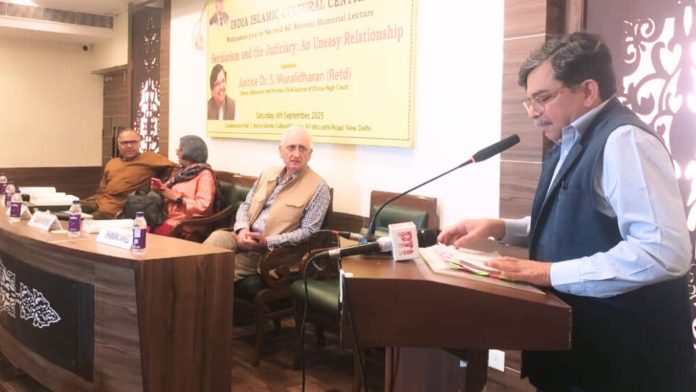New Delhi: Delivering the second A.G. Noorani Memorial Lecture on “Secularism and the Judiciary: An Uneasy Relationship,” Justice S. Muralidhar, senior advocate and former Chief Justice of Orissa High Court, issued a strong critique of how India’s judiciary has handled key questions of secularism. The event was hosted by the India Islamic Cultural Centre.
Justice Muralidhar paid tribute to A.G. Noorani, calling him a fearless and evidence-based scholar whose work continues to guide legal thought. He described India as a civilisation built on plural traditions, rejecting the colonial framing of a Hindu-Muslim binary.
Focusing on the Babri Masjid case, he recalled how the judicial record reflected warnings of conflict from as early as 1885. He denounced the December 6, 1992 demolition as a grave violation of the rule of law, criticising the Supreme Court’s 2019 Ayodhya verdict for contradictions. While acknowledging the unlawful dispossession of Muslims, the Court still awarded the land for temple construction, a move Muralidhar termed “judicial overreach.” He also noted the lack of accountability for leaders who presided over the demolition and the eventual acquittals in related criminal cases despite substantial evidence.
Discussing the Places of Worship Act of 1991, he stressed its importance in preserving communal harmony, warning against fresh litigation in Varanasi and Mathura that challenges the law’s intent. On the Karnataka hijab case, he argued that India’s secularism rests on accommodation of religious practices, not exclusion, and that forcing uniformity undermines constitutional guarantees.
Muralidhar urged the judiciary to uphold Ambedkar’s principle of constitutional morality and warned against selective constitutionalism. He concluded by affirming that secularism is a core constitutional value and the nation’s guarantee of unity. The lecture ended with a standing ovation, followed by the release of his book, (In) Complete Justice? The Supreme Court at 75.




